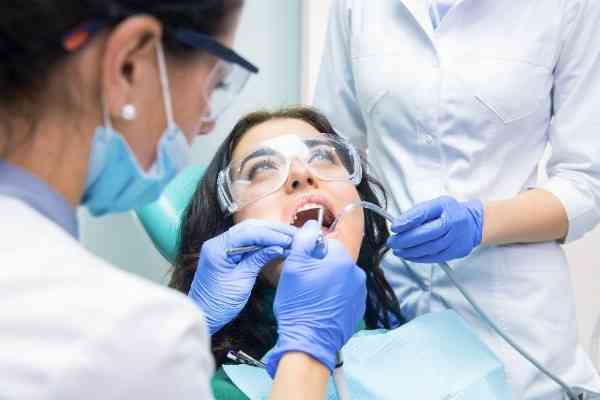healthcare

July 02,2025 • 6 min read
How to Get Help When Your Tooth Suddenly Fails You in Bridgwater

Dental issues have a habit of creeping up unexpectedly. You might be enjoying a meal or brushing your teeth when, all of a sudden, something feels terribly wrong a sharp pain, a loose filling, or even a tooth that’s completely come out. When a tooth fails without warning, it’s not only painful but stressful. In such moments, staying calm and knowing what to do can save your tooth and your sanity. Residents in Bridgwater are fortunate to have access to quick, reliable services like those from an emergency dentist in Bridgwater. With ongoing support from a hygienist in Bridgwater, you can also lower your risk of repeat issues. Here's everything you need to know to act swiftly and wisely.
What Causes a Sudden Tooth Failure?
A tooth can "fail" for many reasons some visible, others hidden beneath the surface.
Common triggers include:
- Tooth decay that weakens enamel
- Old or damaged dental restorations (like fillings or crowns coming loose)
- Trauma from a fall or sports injury
- Clenching or grinding teeth (bruxism)
- Severe gum disease weakening tooth structure
- Underlying infections or abscesses
These issues can simmer quietly before causing an abrupt failure. That’s why prevention and regular dental visits are essential.
Immediate Symptoms That Signal an Emergency
Some warning signs should never be brushed off or masked with painkillers.
Symptoms requiring urgent dental attention:
- Sudden sharp or throbbing pain
- Swelling in the face, jaw, or gums
- A tooth that feels loose or has fallen out
- Cracked, chipped, or fractured teeth
- Bleeding from the gums that won’t stop
- Signs of infection (bad taste, pus, fever)
These are all reasons to contact an emergency dentist in Bridgwater immediately.
What To Do Before You Reach the Dentist
Sometimes, you might need to wait a short while before being seen. Taking the right steps can make a big difference.
Self-care measures you can take:
- Knocked-out tooth? Rinse it gently and store it in milk or saliva
- Swelling? Apply a cold compress to the cheek
- Pain? Take over-the-counter pain relief (avoid aspirin)
- Bleeding? Bite down gently on clean gauze
- Do not eat hard, hot, or sticky foods until assessed
- Call your emergency dentist in Bridgwater immediately
These steps won’t replace professional care but will help stabilise the situation until you're treated.
The Role of Your Emergency Dentist in Bridgwater
An emergency dentist doesn’t just ease pain they provide immediate, practical solutions to prevent long-term problems.
They may perform:
- Emergency fillings or restorations
- Re-cementing of lost crowns or bridges
- Tooth extractions (if required)
- Root canal treatment for infections
- Pain management and antibiotics
- Re-implantation of avulsed (knocked-out) teeth
The quicker you act, the more options you’ll have to save your tooth.
Table: Emergency vs Non-Emergency Know the Difference
|
Dental Issue |
Urgency Level |
Action Required |
|
Knocked-out tooth |
High (Immediate action) |
Call an emergency dentist in Bridgwater |
|
Small chip without pain |
Low (Can wait 1–2 days) |
Schedule a dental visit |
|
Severe toothache with swelling |
High |
Emergency appointment needed |
|
Lost feeling with discomfort |
Moderate |
Visit within 24 hours |
|
Mild gum bleeding after brushing |
Low |
Book a hygienist in Bridgwater for assessment |
|
Dental abscess (pus, fever, pain) |
High |
Requires immediate drainage and antibiotics |
Why You Shouldn’t Delay Treatment
Putting off treatment can turn a simple issue into a complicated and costly one.
What delay can lead to:
- Infections that spread to other parts of the body
- Irreversible damage to tooth structure
- Need for extractions instead of restorations
- Damage to neighbouring teeth or bone
- Pain is becoming more intense or constant
The earlier you seek help from a hygienist in Bridgwater or a dentist, the easier it is to fix the problem, often without major procedures.
Hygienist in Bridgwater: The Prevention Partner
Emergencies may feel random, but they often follow patterns of neglected care. Your hygienist is your frontline defence.
Benefits of regular hygienist visits:
- Removes plaque and tartar that trigger decay
- Monitors gum health and recession
- Detects early signs of damage before pain starts
- Offers tailored advice on brushing, flossing, and diet
- Supports the treatment of gingivitis or mild periodontal disease
- Reduces the frequency of dental emergencies
Prevention is not only cheaper it’s simpler and less painful too.
Managing Dental Anxiety During Emergencies
If the thought of seeing a dentist makes you nervous, you're not alone. But when a tooth fails, postponing care can lead to more trauma and more invasive procedures later.
Tips to cope with dental anxiety:
- Let your dentist know in advance about your fear
- Ask about sedation or calming options
- Use breathing techniques before and during treatment
- Listen to soothing music during your visit
- Bring a supportive friend or relative
- Focus on the fact that pain relief is near
Dental care has evolved your comfort is now a priority.
Eating, Speaking, and Smiling Again Post-Emergency Recovery Tips
After the immediate crisis is handled by your emergency dentist in Bridgwater, the focus shifts to healing and recovery. Knowing how to care for your mouth post-treatment will speed up healing and prevent recurring issues.
Key recovery tips to follow:
- Follow aftercare instructions – Whether you’ve had a filling, extraction, or root canal, carefully follow the guidelines provided.
- Eat soft foods – Stick to lukewarm, soft foods like mashed potatoes, yoghurt, soups, and scrambled eggs for the first couple of days.
- Avoid irritants – Stay away from spicy, acidic, or crunchy foods that could disturb healing tissue or cause discomfort.
- Rinse gently – Use a saltwater rinse to cleanse the mouth without disturbing the affected area.
- Monitor for complications – If you experience renewed swelling, severe pain, or bleeding, contact your dentist immediately.
- Schedule follow-up visits – Don’t skip them; they help ensure healing is progressing properly and spot lingering issues.
And don’t forget: regular care from a hygienist in Bridgwater supports your long-term oral health by reinforcing recovery with preventive strategies and guidance.
Conclusion
Tooth trouble doesn’t always come with a warning, but that doesn’t mean you have to be unprepared. Whether it’s a sudden fracture, a dislodged filling, or shooting pain that keeps you awake, quick action is crucial. Seeking help from a skilled emergency dentist in Bridgwater ensures the problem is handled swiftly, effectively, and with minimal discomfort. Meanwhile, ongoing appointments with your hygienist in Bridgwater will significantly reduce the chance of future emergencies by spotting and solving issues early. When dental problems arise, don’t wait for them to spiral act fast, and trust EDP Group to support you through every step with expert care and attention.
DentalHygiene Details
User Profile
- Full name
- DentalHygiene
- Email address
- hello@hyahygienistappointment.co.uk
- Join Date
- 2025-07-02
- State
- City
- Pincode
- Address
- Follow us on Facebook
- Follow us on Twitter
- Website Name
- Bio